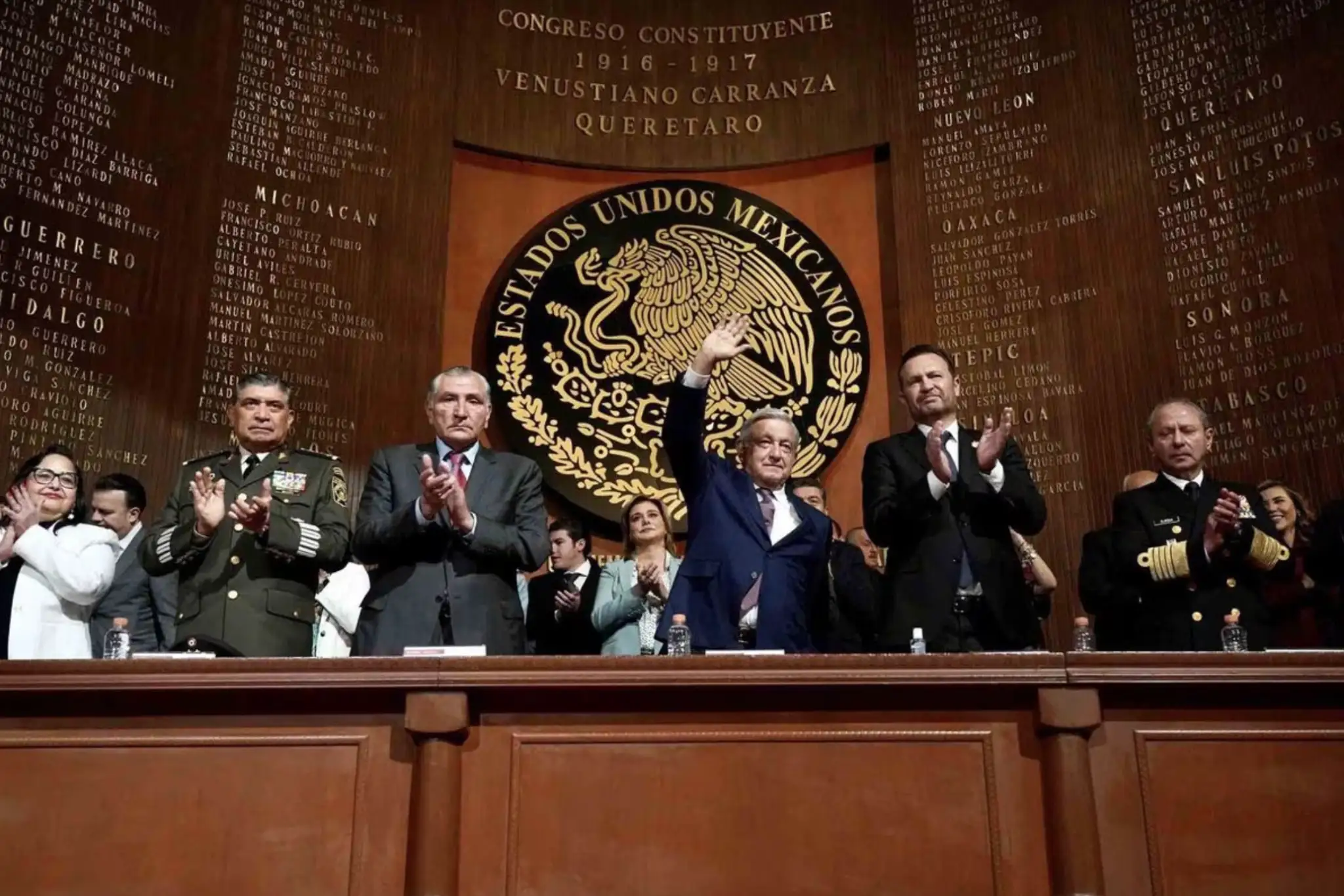Every year on February 5, Mexico celebrates the anniversary of the Constitution promulgation of 1917, which ended the revolutionary revolt against the dictatorship of Porfirio Díaz and the usurper Victoriano Huerta. The commemorative act of the 106th anniversary, traditionally held in Querétaro and attended by representatives of the three branches of government, is always full of symbolism, rituals, and messages in favor of the validity of the Constitution. And this time was no exception, although with the singularities that attend to the circumstances of the country.
At the ceremony, Andrés Manuel López Obrador, constitutional president, was flanked by the Secretary of the Interior and the Secretaries of National Defense and the Navy. In this way, the presiding minister of the Nation Supreme Court of Justice, Norma Piña Hernández, and the president of the Board of Directors of the House of Representatives, Santiago Creel Miranda, were relegated to the far left of the presidium. This is a breach of protocol in a constitutionally civil government and reveals the closeness and distance of the president in office.
This first frame raised different opinions due to the implicit message of a decision of this nature that was taken at the last moment and contravenes the traditions and rituals of this significant date of Mexican constitutionalism. The image of the presidium would be the setting of a scene that will remain for history and as the prelude to the speeches of President López Obrador and Congressman Creel Miranda. The latter belongs to the PAN’s opposition parliamentary fraction.
At the event, the President stated: “We must continue fighting for the ideals of the Mexican Revolution established in the 1917 Constitution; we must continue insisting on abolishing, by legal and democratic means, the reforms contrary to the public interest imposed during the neoliberal period; we must continue proposing changes to the legal framework for the benefit of the people until we return to our highest law all the greatness of its original humanism (to add). In the face of this shameful setback, we can, with pride and with our heads held high, maintain that millions of Mexicans have achieved the approval of some reforms with the hallmark of honesty and humanism”.
The anti-neoliberal narrative line of his government, which was reflected in the speech, has resulted in a binary world of liberals and conservatives, allies and adversaries, people and oligarchy, and has also served to fuel polarization without leaving room for the politics of dialogue, negotiation, and agreements.
Hence, Santiago Creel’s sensible speech calling for reconciliation and to conduct ourselves on the basis of constitutional principles: “Let us banish once and for all our differences and confrontations, particularly, those there have been in the past (to add) we must find, through political dialogue, the unity of this plurality and diversity that is Mexico, not through a single vision. That contradicts the essence of our democracy”. Better yet, he affirmed: “There is no other political morality than the Constitution. That is the morality of all of us who are public servants”.
Mexico is currently experiencing the president’s daily attacks against all those who fall outside the radius of his political and ideological vision. The most recent was against his former colleague Cuauhtémoc Cárdenas, presidential candidate of the left three times and an obligatory reference to the transition to democracy. Cárdenas was pointed out as a member of an opposition collective and, therefore, branded as an adversary and part of the “moderate opposition” that would be against the political movement of the so-called fourth transformation.
The country is in the run-up to the constitutional elections of the states of Mexico and Coahuila (two historical bastions of the PRI), to be held next summer, and the general elections of 2024. There, the Presidency of the Republic will be at stake and, taking into account the votes obtained in the federal elections by the entire opposition (the coalition Va por México of the PRI-PAN-PRD, plus the Movimiento Ciudadano Party), the least that can be envisioned is a close election.
This explains in part the radicalization of the anti-neoliberal discourse and the confrontation with the counselors of the National Electoral Institute, who are responsible for organizing the federal elections and who are coadjutors in the elections of most of the 32 states. This confrontation was visible in the commemorative acts of the Constitution, even when the President of the Court also broke the protocol of the ceremony by not standing up from her chair to applaud the President’s speech. Her attitude His attitude puzzled, to start with, the President himself, who, improvising, affirmed that it was a sign of the diversity in our country.
*Translated from Spanish by Janaína Ruviaro da Silva











